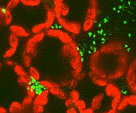Plant Pathology, Department of

Department of Plant Pathology: Faculty Publications
Document Type
Article
Date of this Version
2012
Citation
Hamacher K, Greiner T, Ogata H, Van Etten JL, Gebhardt M, et al. (2012) Phycodnavirus Potassium Ion Channel Proteins Question the Virus Molecular Piracy Hypothesis. PLoS ONE 7(6): e38826. doi:10.1371/journal.pone.0038826
Abstract
Phycodnaviruses are large dsDNA, algal-infecting viruses that encode many genes with homologs in prokaryotes and eukaryotes. Among the viral gene products are the smallest proteins known to form functional K+ channels. To determine if these viral K+ channels are the product of molecular piracy from their hosts, we compared the sequences of the K+ channel pore modules from seven phycodnaviruses to the K+ channels from Chlorella variabilis and Ectocarpus siliculosus, whose genomes have recently been sequenced. C. variabilis is the host for two of the viruses PBCV-1 and NY-2A and E. siliculosus is the host for the virus EsV-1. Systematic phylogenetic analyses consistently indicate that the viral K+ channels are not related to any lineage of the host channel homologs and that they are more closely related to each other than to their host homologs. A consensus sequence of the viral channels resembles a protein of unknown function from a proteobacterium. However, the bacterial protein lacks the consensus motif of all K+ channels and it does not form a functional channel in yeast, suggesting that the viral channels did not come from a proteobacterium. Collectively, our results indicate that the viruses did not acquire their K+ channel-encoding genes from their current algal hosts by gene transfer; thus alternative explanations are required. One possibility is that the viral genes arose from ancient organisms, which served as their hosts before the viruses developed their current host specificity. Alternatively the viral proteins could be the origin of K+ channels in algae and perhaps even all cellular organisms.


Comments
© 2012 Hamacher et al. This is an open-access article distributed under the terms of the Creative Commons Attribution License, which permits unrestricted use, distribution, and reproduction in any medium, provided the original author and source are credited.